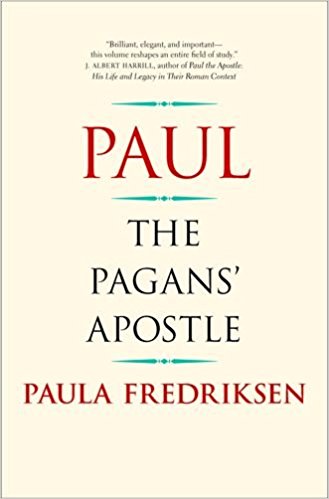As for Paul the persecutor (see Acts 7 and 8.1 and 9.1) she theorizes that Paul was practicing the 39 lashes, rather than urging stoning, despite what Acts says. This however not only flies in the face of Acts, it also flies in the face of 1 Cor. 15.9– I persecuted ‘the church of God’. Who is that? He does not say the synagogue, or even Jewish followers of Jesus in the synagogue, he says ‘the church of God’ which involves both Jews and Gentiles. So no…. it is not likely that Paul was merely flogging Jews who believed in Jesus.
And Gal. 1.13, whether one translates the key phrase violently or to the uttermost, Paul also says he was trying to destroy the church of God, which again cannot refer to punishment of or in the synagogue. Finally, something should be said about 1 Tim. 1.13—I was a blasphemer, a persecutor, and aggressive. None of these texts suggest normal discipline within the synagogue, and the first two suggest a separate entity the ekklesia of God was the object of the persecution.
Several of the other major tenants of this study come to light gradually as one reads from it: 1) Paul’s rhetoric is not to be confused with actual conditions in the assemblies; 2) Paul is writing only to Gentiles (even in the case of Romans this cannot be maintained. There would be no point in saying ‘I’m talking to you Gentiles in Rom. 11.13 if absolutely no one else was in the audience listening).; 3) Paul continued to live by the ancestral customs of Jews.
Let’s deal with the last one first. Paul took a picking and choosing approach to that matter as he says in 1 Cor. 9, and as becomes clear if one reads the whole progress of the argument in 1 Cor. 8-10. He says that the person who has too many scruples about meat, surely a Jewish person, should be respected and not coerced to eat, and even the Gentiles should abstain from eating meat sacrificed to idols in a situation where it might cause a Jewish Christian to stumble. Paul however agrees with those he calls ‘the strong’ those who don’t have such scruples, and overall he says eating or not eating, so far as the laws or customs that apply in the ekklesia is a matter of adiaphora.
Now no good Mosaic covenant observant Jew would say what you eat when it comes to meat is a matter of adiaphora. Paul observes the Mosaic customs when he feels it will help the situation with Jewish followers of Jesus, or even to win some to the following of Jesus, but he feels no obligation to do so. The person who does this, and also who says circumcision doesn’t matter, what matters is new creation is not an observant Jew on an ongoing basis, or as a matter of obedience to the Mosaic law or custom. He just isn’t.
As for Paul’s rhetoric, he is trying to persuade his audiences to believe and behave in certain ways. Yes, he uses hyperbole and other rhetorical devices, but no he is not making things up about the situations in his churches or what matters to himself. Yes he talks to his audience about how they ought to be, and knows they often fall short, but that is not a matter of mere rhetoric, it’s a matter of whether his converts are doing what he says they ought to do and be. Were there fully Law observant Jewish followers of Jesus in the early second century— certainly as Justin’s Dialogue with Trypho shows. Was Paul just like them? No. There was a diversity or spectrum of belief and praxis in early Christianity, Paul was not on the ‘closer to the consistently Torah true’ end of the spectrum, except when he chose to be for various prudential reasons.













